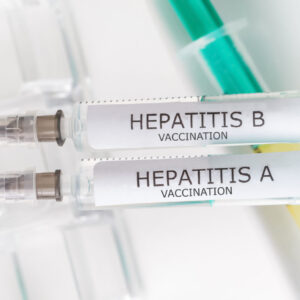World Hepatitis Day: Why Should Seniors Care?
July 31, 2023 | Healthy lifestyles, Prevention of Illness and Management of Chronic Conditions

By Megan Maher, BSN, RN, Aging Life Care Manager and RN Case Manager, Windward Home Health
July 28 was World Hepatitis Day. Many individuals do not know what hepatitis is or how it may affect them, but older adults should. Seniors (ages 65 and over) are at higher risk of acquiring all types of hepatitis and developing adverse medical outcomes.
Hepatitis is inflammation of the liver caused by a viral infection. It can lead to severe liver disease, cancer, and cirrhosis. It is associated with an increased risk for other illnesses such as kidney and cardiovascular disease, diabetes, depression, and cognitive impairment. There are over six different kinds of hepatitis. The most prevalent for seniors are hepatitis A, B, and C.
Hepatitis A has increased in prevalence in San Diego County over the last decade. Spread is largely due to the increased homeless population with limited access to sanitation, as well as inadequate cleaning of fresh produce. This form of hepatitis is highly contagious and spreads through person-to-person contact with an infected individual’s stool or contact with a contaminated object. Some common symptoms are nausea, vomiting, pale stools/diarrhea, joint pain, fever, and fatigue. The treatment for Hep A is antiviral and supportive therapies. It is largely preventable by frequent hand washing, not sharing personal items with others, and proper sanitation of food items. However, the best protection is vaccination, two shots six months apart.

Hepatitis B (HBV) and C (HBC) are both transmitted through blood and certain body fluids. Of the 4.1 million people in the U.S. exposed to HCV, about 70% of those were born between 1945 and 1964 (the baby boomer generation). Peak transmission of HCV was between 1970 and 1990. The disease is transmitted through sharing needles, improper sterilization of medical equipment, inadequate screening of blood, having sex with an infected individual, or from mother to baby during birth. Unfortunately, acute symptoms are not normally detected, and the viral infection can remain in the body for many years, slowly causing significant damage without the person’s knowledge. During this period, they may unknowingly transmit the disease to others. Many of these infections have decreased due to vaccination efforts, donor blood screening, and increased availability of harm-reduction programs for those who use drugs. However, as the aging population seeks healthcare in many ambulatory care settings, including long-term care facilities, concerns remain. There is no cure for HBV, but there is a safe and effective vaccine with up to 98-100% protection against the virus. There is no vaccine for HCV, but new medications could potentially treat and cure HCV if recognized early.
Hepatitis is a devastating but largely preventable illness that primarily affects older adults, vulnerable immune systems, and those with poor access to medical care. Every 30 seconds, someone dies from a hepatitis-related disease. With treatment, screening, and vaccinations currently available, all of these deaths are considered preventable. Unfortunately, lack of access and knowledge of the illness perpetuates this.
The best way to mitigate your hepatitis risk is to advocate for screening of the most common forms of hepatitis, get vaccinated for Hep A and B, and consistently practice safe and effective hygiene methods during your care, sexual activities, and consumption of goods. At your next doctor’s appointment, ask your physician what you can do to lower your risk of getting hepatitis.

